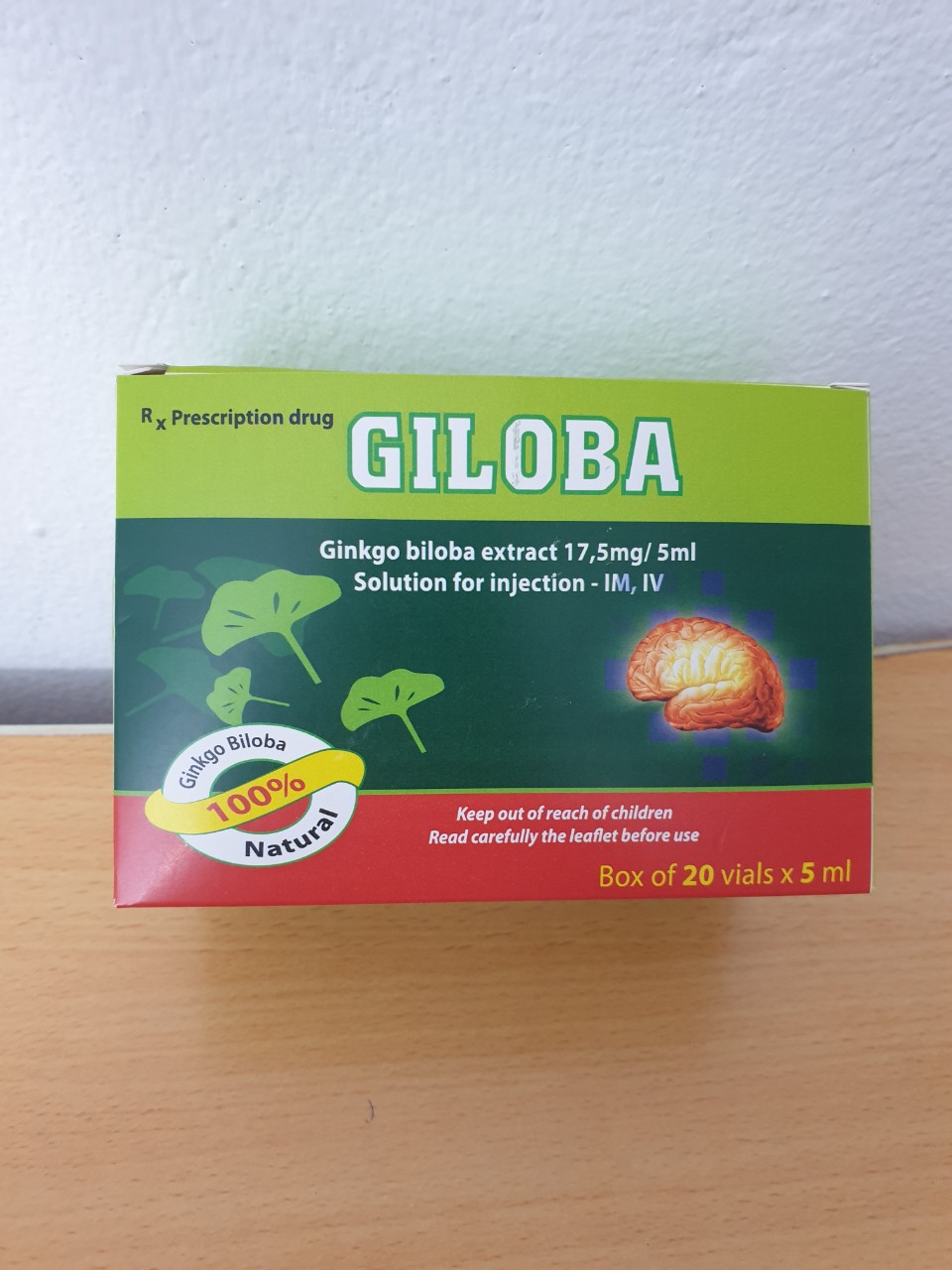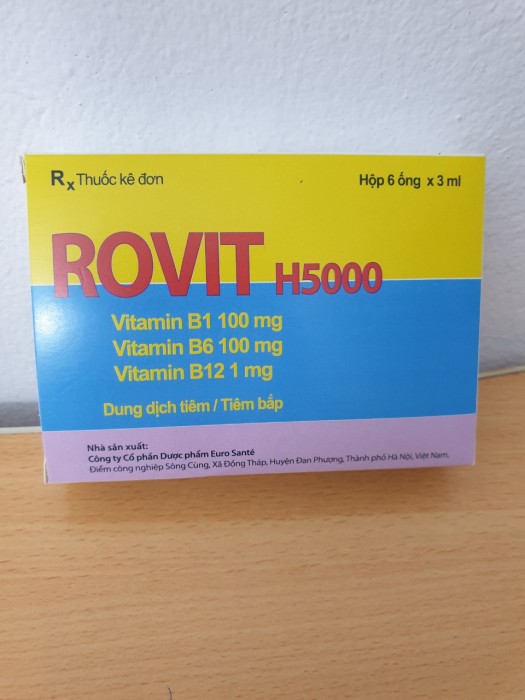1. Drug name
Giloba
2. Drug formula ingredients
Each 5ml tube contains: Ginkgo biloba extract (standardized EPG 246) (equivalent to 4.2mg total flavonol glycoside) 17.5mg
Excipients: q.s 5 ml
3. Dosage form
Injectable solution.
4. Route of administration
Intramuscular injection, intravenous injection.
5. Indications
Treatment of cerebral and peripheral blood circulation disorders such as:
- Brain dysfunction: difficulty remembering, dizziness, tinnitus, headache and emotional changes accompanied by anxiety.
- Hearing loss (supportive treatment) due to neck syndrome.
- Peripheral arterial circulatory disorders with preservation of intact circulation (intermittent claudication).
6. Administration, dosage
Dosage
1 tube - 2 tubes/time x 2 times/day.
Administration
intramuscular injection or slow intravenous injection.
Must be used as directed by a doctor and must have a medical staff perform the injection. Do not use it arbitrarily.
7. Contraindications
Do not use the drug for patients:
· Patients who are allergic or sensitive to any ingredient of the drug.
· Do not use medicine for pregnant women.
· Do not use medicine for people with bleeding disorders, patients with bleeding disorders, blood clotting disorders, taking anticoagulants , or bleeding.
8. Special warnings and precautions for use
Be cautious when using this medicine for people taking anticoagulants.
The medicine cannot be used instead of drugs to treat high blood pressure .
The drug does not cause a reverse effect on sugar metabolism, so diabetics with frequent circulatory disorders can use it.
Do not use the drug when there are signs of:
· Discolored, no longer transparent, expired.
· The medicine tube is cracked or broken.
· Tell your doctor and stop using immediately if allergic reactions occur.
9. Fertility, pregnancy and lactation
The drug should not be used by pregnant women or breastfeeding women.
10. Effects on ability to drive and use machines
Be cautious when using the drug for people who drive and operate machinery, because the drug can cause dizziness and lightheadedness.
11. Drug interactions and incompatibilities
There are no specific clinical research data available. However, the drug can cause adverse interactions with anticoagulants and affect the platelet aggregation process. Should be used with caution
12. Undesirable effects
Some mild and rare side effects of the drug include:
Digestive disorders.
The patient has a headache.
Skin allergies.
13. Overdose and treatment
There is currently no information about drug overdose. However, while using the drug, if the patient experiences any serious symptoms, they should immediately notify the doctor and go to the nearest medical center for timely treatment.
14. Pharmacodynamic properties
Pharmacological group: Anti-dementia drugs
ATC code: N06DX02
Ginkgo biloba (Ginkgo biloba) is concentratedly extracted from the dried leaves of the Ginkgo biloba tree. Ginkgoacea is the main ingredient responsible for the effects of Ginkgo Biloba extract. Ginkgoacea helps increase blood circulation in the arteries of the limbs and at the same time stabilizes capillary permeability in spontaneous edema and increases cerebral blood circulation. Ginkgoacea also helps increase glucose consumption in the brain, helping to activate the energy conversion process of cells, helping the brain's oxygen consumption process to occur normally. Ginkgo biloba extract also helps reduce the risk of thrombosis and has many other benefits for the circulatory system, especially in the elderly. In addition, it also has antioxidant properties. Ginkgo biloba may enhance memory and cognitive speed, helping to prevent the progression of dementia symptoms, especially if the dementia is thought to be the result of atherosclerosis. There is also evidence that Ginkgo biloba extract can relieve leg pain caused by clogged arteries. It can also help with some other circulation problems. Additionally, ginkgo may reduce PMS symptoms, such as breast tenderness and mood changes.
15. Pharmacokinetic properties
Absorption: The drug is rapidly absorbed after administration.
Distribution: The drug is widely distributed to tissues, and it has a high affinity for eye tissue, ganglionic tissue or nervous tissue, especially for the hypothalamus.
Metabolism: The drug is metabolized mainly in the liver.
Elimination: The drug is eliminated through the respiratory tract, feces and urine.
16. Packaging specifications
Box of 20 x 5ml tubes with instructions for use.
17. Storage conditions, expiration date, and quality standards of the drug
Storage conditions: Cool and dry place, protected from light, temperature not exceeding 30 o C.
Expiry date: 24 monthsfrom the date of manufacture.
Quality standards of drugs: in house
18. Name and address of the drug manufacturing facility
Euro Santé Pharmaceutical Joint Stock Company
Song Cung industrial site, Dong Thap commune, Dan Phuong district, Hanoi city, Vietna












